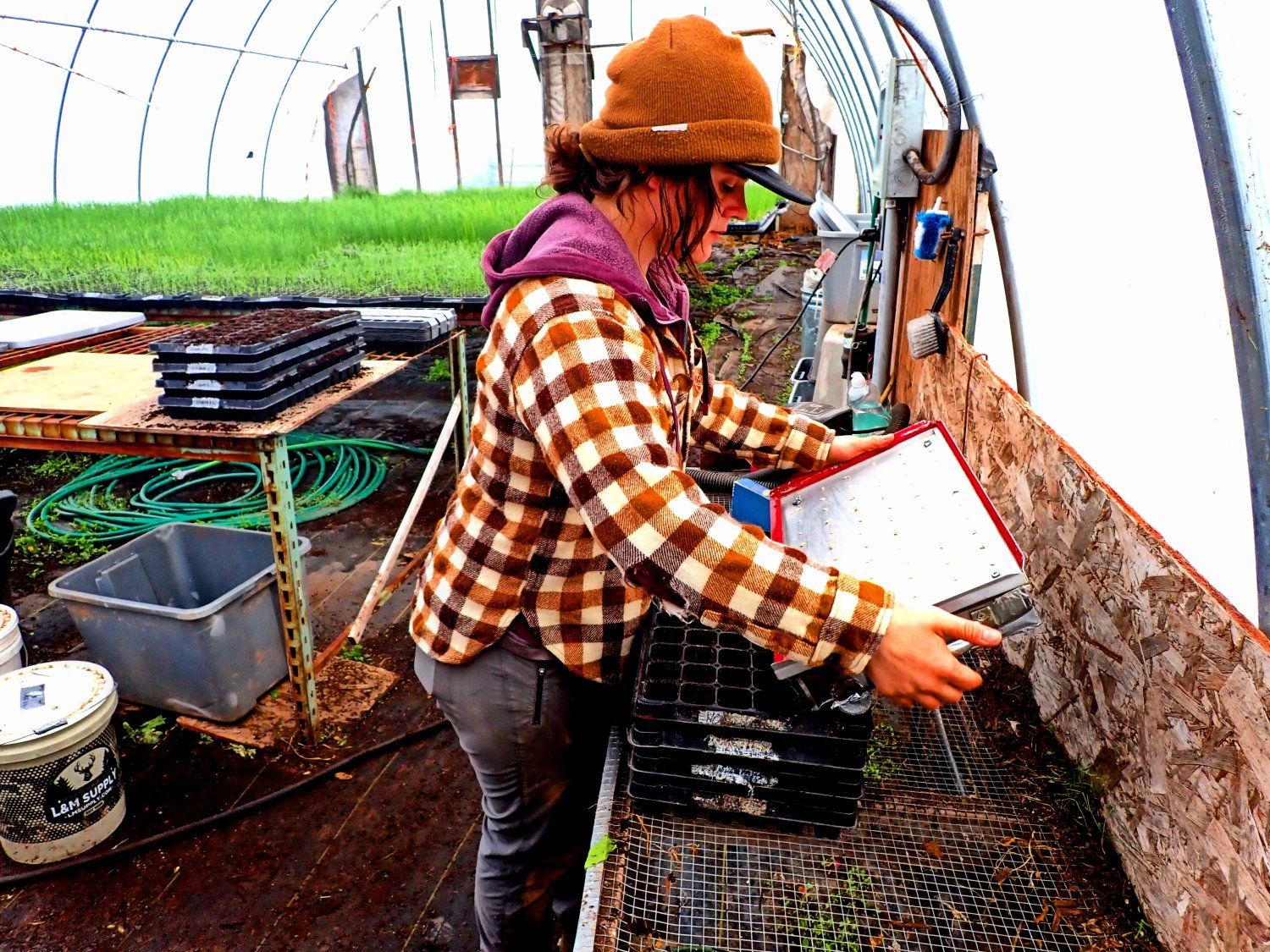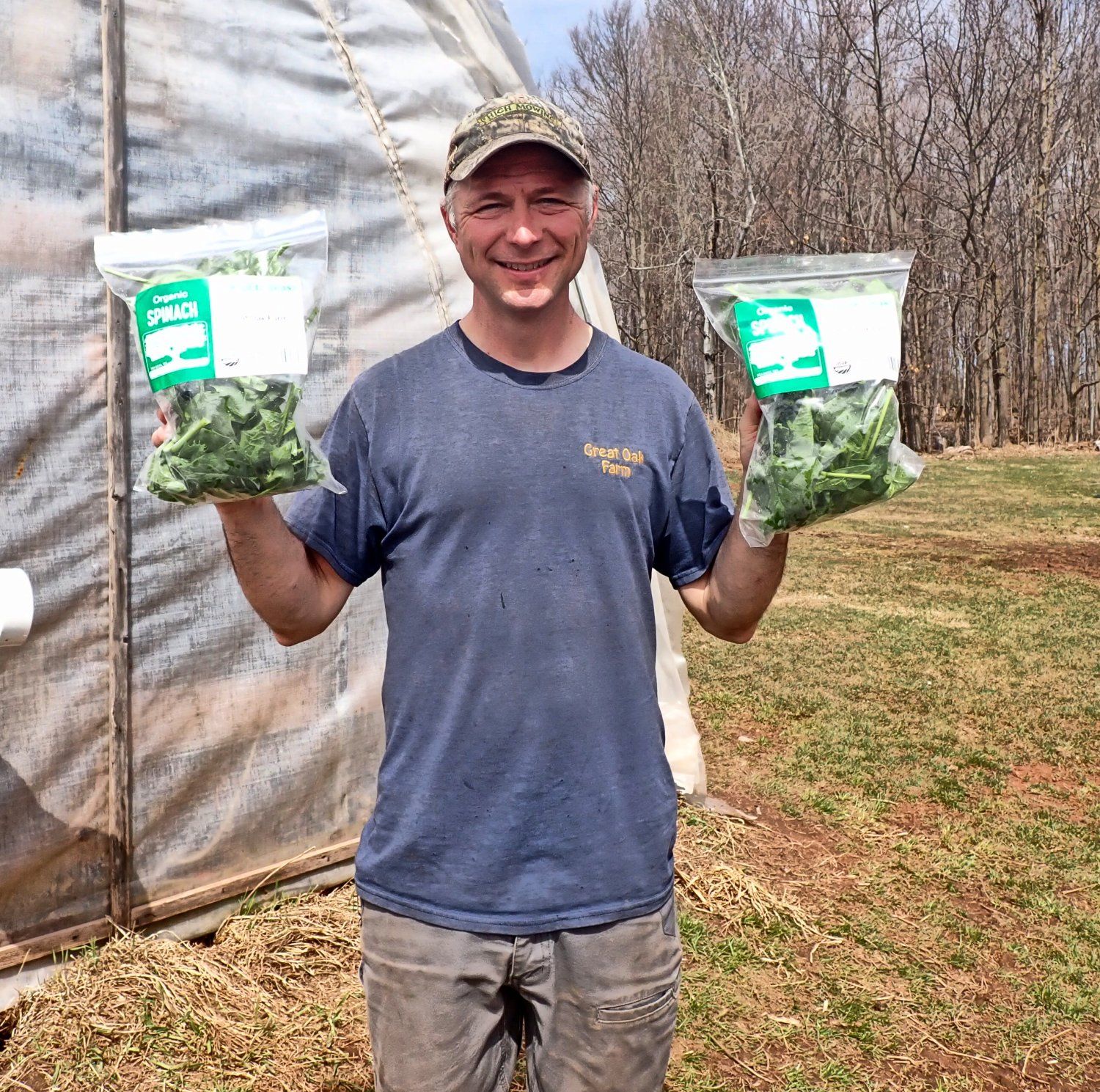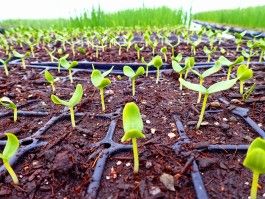Happy Earth Day! It was another week of rain, snow, and cold. But despite the lousy weather, the cucumbers are spreading their wings and starting to fly already. And, cold or not, we had another week of planting, planting, and more planting in the greenhouse. This week we seeded our big round of brassicas - fall brussels sprouts, summer and fall cabbages, as well as another round of summer broccoli.
.jpg)
The vacuum seeder excels at articulating those little round brassica family seeds, so between the 3 of us we got all those plants seeded in one morning. Once the flats get seeded, we stick them (well, as many of them as will fit anyway) in our home-made germination chamber. It's essentially a foam box built around some shelves that has a light bulb and a crock pot inside set to a thermostat to keep it about 20 degrees warmer than the ambient greenhouse temperature of about 55 degrees at night. It's not much to look at, but that germination chamber really does a great job at getting those seeds to pop uniformly and quickly, helping to assure that they are all far enough along at the same time to allow us to transplant the entire flat worth of cells at once. No stragglers allowed.
.jpg)
Over 9 thousand transplants destined for our outside fields were started this week, so now the clock is really ticking - we will have boatloads (well, tractorloads!) of starts ready to be put into the soil in 4 weeks.
In that time, we need the soil to dry out enough to allow us to get the ground prepared for planting, and hopefully knock out a round of weeds with some cultivation right before we transplant. Looking outside, it seems impossible to think it will be dry enough to drive tractors around without sinking down to the axles, but we have to get the ball rolling regardless. With our short growing season up here, counting our chickens before they hatch is part of the process. Otherwise we run out of summer growing conditions and crops don't have time to mature before the days get shorter and colder. .jpg)
And despite the cold temps outside, the tomatoes are on track to get transplanted out to the hoophouses next week. We'll be using row cover and portable heaters as needed to keep these tender plants above freezing and help them get well established this spring while the weather tends to be "unreliable" through the end of May.
Tuesday looks like the last well-below freezing night in the forecast, so likely we'll get them out later in the week. Again, we need to get as far a head start on summer as we can in order to have good harvests of warm season crops like tomatoes.
That means however that our spinach crop needs to be turned under to make room for these lovely transplants, so savor those incredible winter spinach leaves while you can. Next week may be the last chance for Great Oak Farm spinach till fall. Farmer Brian also has some spinach growing, and we hope that his spinach can pick up for you when our spinach drops off. Spring spinach is such a sweet treat after a long winter of few fresh greens to enjoy.
.jpg)
Unfortunately, we aren't the only ones who have had a long cold winter with few fresh greens to enjoy. The other day, we went out to pull the row cover back and weed in the beet/scallion/collard hoophouse, and were shocked to see that nearly every single collard transplant had been munched off - many clear down to the ground. Pretty frustrating. Those collards represented 5 weeks worth of work so far, and are an important crop for us especially in the spring.
Now, I know what many of you are thinking - "I don't really like collards that much anyway - it's ok!" Those 2 beds of collards however would have been a full season crop for us to harvest a little bit every week from June through October. And those small, regular, weekly sales add up - from a financial perspective, they would have been a couple thousand dollars of revenue over the entire season.
.jpg)
So, after putting out an impressive array of traps in there to try to catch whatever critter was chowing our plants, we put our heads together and came up with plan B based on what seeds we had available at the time. That hoophouse space is too important to leave fallow. We replanted the few remaining collard transplants that we had stocked away in the greenhouse just in case of emergency, and started more flats of collards that can fill the space (but won't be ready to transplant there for 4 more weeks). We also started more pea transplants that could be put into that space in the next 2 weeks.
Again, I think I know what most of you are thinking... "Yay, more peas!" :) I love fresh snap peas as much as the next person, however snap peas have been fussy for us in the past in hoophouses, so relying on them to fill that space and provide a good harvest is a fair bit of guesswork. Plus, if critters are munching collard transplants (I have never seen anything munch hoophouse collard transplants besides caterpillars for as long as we've been farming here) they would absolutely LOVE to devour some fresh, sweet pea transplants.
Hopefully there are more green things growing outside for critters to munch by the time we transplant peas in there, so the animals leave our hoophouse crops alone. They even munched some scallions in there. Scallions, for crying out loud! They must be hungry.
We'll keep the second round of collards growing in the greenhouse as "crop insurance" so we have at least something to plant in that space a month from now in case of pea damage/problems. If they are not needed in the hoophouse, we'll make a space for them in our outside fields and hopefully still get some collard harvests, even if they are later than we would like.
That's farming - we're always adapting, always adjusting the plan to whatever challenge comes our way. And if I have learned one thing over the last 20 years of farming, it's that there will always be challenges!
That's it from the farm this week friends. Be well, eat well, and we'll see you again next week.
In community,
Farmer Chris
Great Oak Farm





